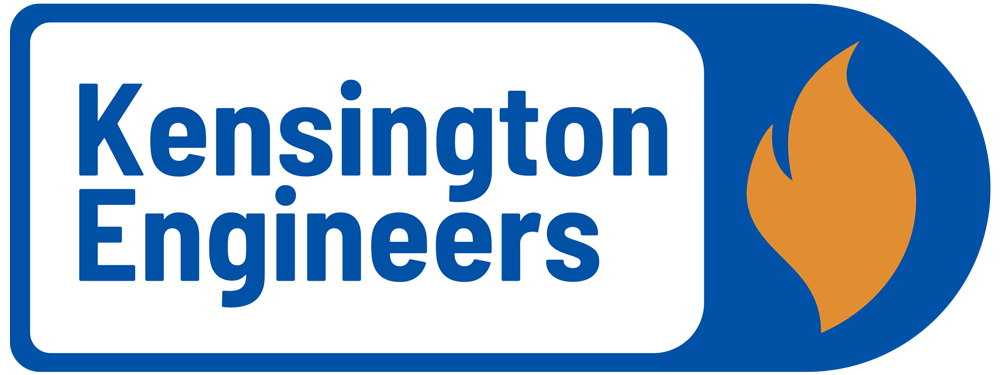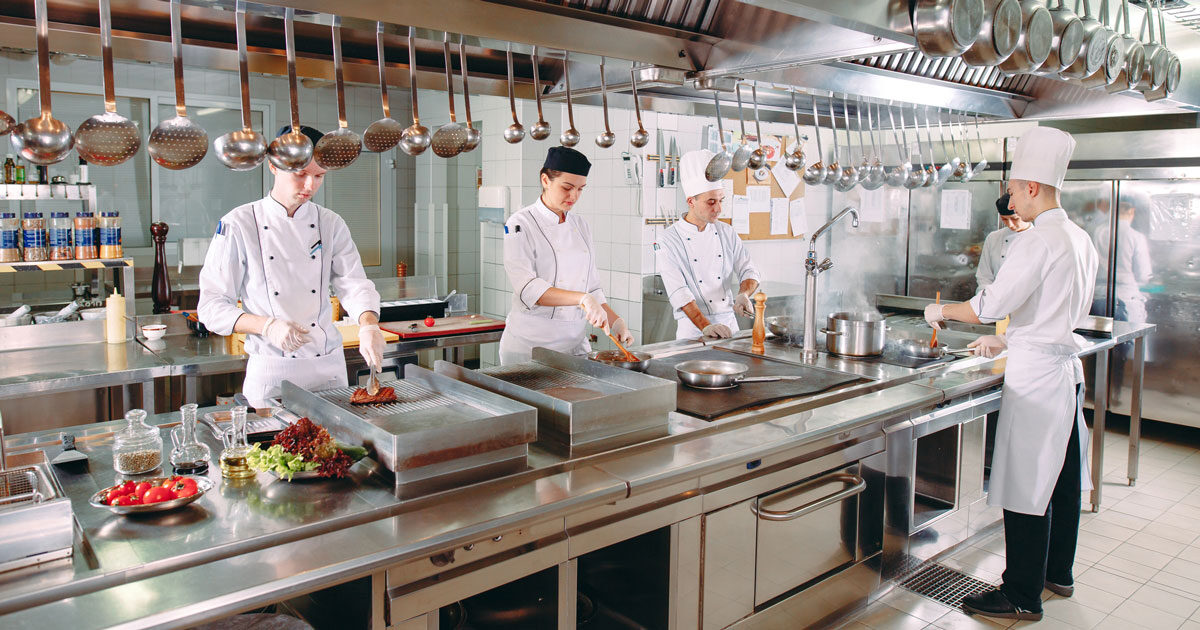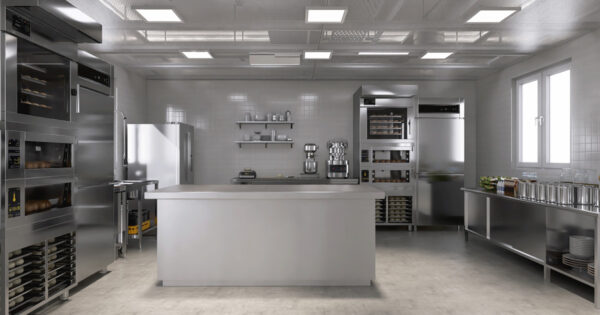In a commercial kitchen, the efficiency and reliability of catering equipment are paramount to smooth operations. Equipment failures not only lead to costly downtime but can also compromise food safety, regulatory compliance, and overall business reputation. A well-structured maintenance routine is essential to ensuring that all appliances function optimally, preventing sudden breakdowns and extending the lifespan of critical assets.
Neglecting routine servicing can result in grease accumulation, inefficient heating or cooling, and even hazardous conditions such as gas leaks or electrical failures. Additionally, failure to maintain equipment in accordance with industry standards can lead to regulatory non-compliance, putting businesses at risk of fines or operational shutdowns.
This article provides a comprehensive maintenance checklist tailored for commercial catering equipment, helping businesses uphold high operational standards while reducing unexpected repair costs. By implementing a proactive maintenance schedule, kitchen operators can enhance energy efficiency, improve safety, and ensure uninterrupted service for their customers.
The Importance of a Structured Maintenance Plan
A structured maintenance plan is fundamental to the efficient operation of commercial catering equipment, ensuring longevity, compliance, and optimal performance. Without a proactive servicing schedule, equipment deterioration accelerates, leading to increased energy consumption, frequent breakdowns, and costly emergency repairs.
Regular maintenance minimises these risks by identifying potential faults before they escalate. Properly serviced appliances operate at peak efficiency, reducing operational costs and preventing unnecessary energy wastage. This is particularly critical for high-demand kitchen environments, where even minor inefficiencies can result in significant financial losses over time.
Beyond cost savings, a structured maintenance plan ensures compliance with health, safety, and industry regulations. Gas and electrical appliances must meet stringent safety standards, and failure to adhere to prescribed maintenance protocols can result in legal liabilities, fines, or forced closures. Routine servicing also plays a vital role in hygiene control, as neglected equipment can lead to food contamination risks due to grease buildup, bacterial growth, or malfunctioning refrigeration units.
While in-house maintenance procedures help sustain equipment between service intervals, professional inspections and servicing by qualified engineers are indispensable. Expert engineers perform in-depth diagnostics, precision calibrations, and safety certifications that exceed basic cleaning and visual checks. By implementing a structured maintenance plan, commercial kitchens not only safeguard their investment in equipment but also maintain uninterrupted service, ensuring reliability during peak operational hours.
Daily Maintenance Tasks
Daily maintenance is the first line of defence against equipment failure in a commercial kitchen. Implementing a structured daily routine helps prevent the accumulation of grease, food debris, and scale deposits, all of which can impair performance and pose serious safety hazards. Staff should be trained to carry out essential checks at the end of each shift, ensuring that equipment remains clean, functional, and ready for the next service period.
Cleaning and Sanitisation
- Cooking Surfaces & Appliances – Wipe down grills, ovens, fryers, and stovetops with suitable degreasers to prevent carbon buildup and fire risks.
- Grease Traps & Ventilation Hoods – Empty grease traps and clean extraction filters to maintain airflow and reduce the likelihood of grease fires.
- Refrigeration Units – Remove spills and expired food to prevent bacterial growth and odours. Check that doors close properly to maintain energy efficiency.
- Water-Fed Equipment – Flush coffee machines, steamers, and dishwashers to prevent scale buildup and ensure optimal performance.
Basic Equipment Checks
- Gas & Electrical Connections – Inspect for loose wires, damaged power cords, and gas leaks (such as unusual odours or irregular flame patterns). Any suspected faults should be reported immediately for professional inspection.
- Temperature Control & Thermostats – Verify that ovens, fridges, and freezers are maintaining correct temperatures to ensure food safety compliance.
- Ventilation Systems – Check extractor fans and air ducts for obstructions to prevent heat and smoke buildup in the kitchen.
- Door Seals & Hinges – Inspect seals on ovens, fridges, and dishwashers to prevent energy wastage and maintain insulation efficiency.
A disciplined approach to daily maintenance ensures that small issues are addressed before they escalate into costly repairs or equipment failures. In addition, maintaining a daily log of maintenance activities provides valuable insights into performance trends and highlights recurring issues that may require professional intervention.
Weekly Maintenance Tasks
While daily maintenance focuses on surface-level cleaning and immediate operational checks, weekly maintenance involves more in-depth inspections and servicing of key components. This routine helps to detect early signs of wear and tear, ensuring that equipment remains efficient and compliant with safety regulations. Weekly maintenance tasks should be carried out by kitchen staff with a basic understanding of equipment functionality, with detailed records kept to track performance trends and potential issues.
Inspection of Moving Parts
- Lubrication of Hinges, Bearings, and Motors – Mechanical components in ovens, refrigeration units, and mixers require regular lubrication to prevent friction damage and extend their service life.
- Checking Door Seals and Gaskets – Inspect rubber seals on fridges, freezers, and dishwashers for cracks or looseness. Compromised seals reduce efficiency and force the equipment to work harder, increasing energy consumption.
- Assessing Wear on Burners and Heating Elements – Gas burners should have a steady blue flame, indicating optimal combustion. Uneven flames or excessive yellow/orange colouring may signal blocked jets or gas pressure issues. Electric heating elements should be checked for signs of deterioration or inconsistent heating.
Deep Cleaning Protocols
- Degreasing Burner Components & Ventilation Systems – Remove and clean burner grates, pilot lights, and ventilation hood filters to maintain optimal airflow and prevent fire hazards.
- Flushing Coffee Machines, Steamers & Dishwashers – Weekly descaling helps to remove mineral deposits that accumulate in water-fed appliances, ensuring continued efficiency and preventing blockages.
- Cleaning Refrigeration Coils – Dust and grease buildup on condenser coils in refrigeration units can reduce cooling efficiency and increase energy consumption. Coils should be carefully vacuumed or brushed to maintain optimal performance.
A proactive weekly maintenance schedule helps prevent major breakdowns, reduces long-term repair costs, and ensures that commercial kitchen equipment continues to operate safely and efficiently. By integrating these tasks into routine kitchen operations, businesses can minimise disruptions and extend the lifespan of critical appliances.
Monthly Maintenance Tasks
Monthly maintenance involves a more thorough evaluation of catering equipment, focusing on performance optimisation, safety checks, and early fault detection. These tasks go beyond daily and weekly routines, requiring a more technical approach to ensure compliance with operational standards and regulatory requirements. Monthly inspections should be carried out by trained staff or professional engineers where necessary, with detailed records kept to track equipment condition over time.
Electrical and Gas Safety Checks
- Inspect Wiring and Electrical Components – Examine power cords, plugs, and internal wiring for any signs of wear, overheating, or damage. Faulty electrical connections pose a fire risk and should be addressed immediately.
- Gas Leak Detection and Combustion Testing – Perform leak detection tests on gas appliances using an approved method, such as a gas detector or soapy water test. Inspect burner jets for blockages and verify that flames burn evenly and efficiently.
- Check Emergency Shut-off Valves – Ensure that gas and electrical emergency shut-off mechanisms are fully operational to guarantee safety in case of an emergency.
Operational Testing and Performance Optimisation
- Assess Cooking Equipment Calibration – Ovens, grills, and fryers should be tested to confirm that temperature controls are accurate and responsive. Inaccurate calibration can lead to inconsistent cooking results and energy wastage.
- Monitor Energy Consumption Trends – Increased energy use without a change in workload may indicate inefficiencies such as failing insulation, worn-out components, or system leaks. Identifying these issues early can prevent costly repairs.
- Evaluate Refrigeration and Freezing Efficiency – Measure internal temperatures and check refrigerant levels to ensure optimal cooling performance. Fluctuating temperatures or excessive frost buildup may indicate a failing thermostat or compressor issues.
A structured monthly maintenance routine not only enhances the efficiency and reliability of commercial catering equipment but also helps businesses comply with safety regulations and manufacturer servicing guidelines. Addressing minor issues at this stage prevents expensive emergency repairs and ensures that all kitchen equipment continues to operate at peak performance.
Quarterly and Annual Professional Servicing
While routine in-house maintenance helps sustain catering equipment performance, professional servicing is essential for comprehensive system checks, regulatory compliance, and long-term operational efficiency. Quarterly and annual servicing, conducted by qualified engineers, ensures that all critical components are operating safely and effectively while preventing avoidable breakdowns. These scheduled servicing sessions involve advanced diagnostics, deep cleaning, and certification where necessary, ensuring businesses remain compliant with industry regulations.
Full System Inspection & Servicing (Quarterly & Annual)
- Comprehensive Safety Checks on Gas & Electrical Systems – Engineers conduct in-depth inspections of wiring, connections, and pressure points in gas and electric appliances. Gas lines are pressure-tested for leaks, and electrical circuits are examined for potential faults.
- Thermostat & Temperature Control Calibration – Ovens, grills, refrigerators, and freezers are tested for accurate temperature control. Incorrect calibration can affect food safety and energy efficiency, leading to inconsistent performance.
- Pressure Testing of Water-Fed Equipment – Dishwashers, coffee machines, steamers, and combination ovens are assessed for water pressure irregularities, leaks, and limescale buildup, preventing operational failures.
Legislative Compliance & Certification
- Gas Safety Certification & Electrical Compliance – Gas appliances must undergo scheduled testing to ensure they meet safety standards, with certification provided upon successful inspection. Electrical systems are also checked to comply with industry regulations.
- Ventilation & Extraction System Compliance – Engineers inspect and clean ducting, filters, and exhaust systems to prevent fire risks and ensure optimal airflow. Compliance with ventilation regulations is crucial for maintaining a safe working environment.
- HACCP & Food Safety Documentation Review – Catering businesses must adhere to food hygiene standards, and servicing engineers help verify that temperature-controlled equipment meets Hazard Analysis and Critical Control Points (HACCP) regulations.
A proactive approach to quarterly and annual servicing significantly reduces the risk of unexpected failures and costly emergency repairs. By partnering with specialist catering equipment engineers, businesses can ensure operational efficiency, compliance with legal requirements, and a safer, more reliable kitchen environment for both staff and customers.
Signs That Equipment Requires Immediate Repair
Even with regular maintenance, commercial catering equipment can develop faults that require immediate professional attention. Ignoring early warning signs can lead to operational disruptions, safety hazards, and costly emergency repairs. Kitchen operators should be vigilant and act promptly when equipment exhibits abnormal behaviour, ensuring that minor issues do not escalate into major failures.
Unusual Noises or Vibrations
- Loud clanking, grinding, or buzzing sounds in ovens, refrigerators, or mixers may indicate worn bearings, motor failure, or misaligned components.
- Excessive vibrations in fryers, dishwashers, or ventilation systems suggest potential mechanical faults that could compromise performance and safety.
Inconsistent Heating or Cooling
- Ovens and grills failing to reach or maintain set temperatures may be experiencing faulty thermostats, heating elements, or gas supply issues.
- Refrigerators and freezers struggling to maintain correct temperatures can result from failing compressors, refrigerant leaks, or sensor malfunctions, putting food safety at risk.
Unexplained Increases in Energy Consumption
- A sudden rise in electricity or gas usage without changes in kitchen workload may signal inefficiencies in heating elements, compressors, or gas burners.
- Equipment working harder than necessary often leads to premature wear and increased repair costs if left unaddressed.
Gas or Electrical Issues
- Flickering pilot lights, yellow/orange flames, or the smell of gas indicate potential leaks or incomplete combustion, posing a serious safety risk. Immediate shutdown and inspection by a certified gas engineer are required.
- Tripping circuit breakers, burning smells, or inconsistent power supply suggest electrical faults that could lead to fire hazards or complete equipment failure.
Poor Performance or Operational Delays
- Slow heating, extended cooking times, or irregular cooking results can indicate failing heating elements, sensor malfunctions, or clogged burner components.
- Dishwashers and steamers producing low water pressure or leaving residue may require urgent descaling, pump servicing, or filter replacement.
Water Leaks or Excess Moisture Accumulation
- Pooling water around refrigeration units, dishwashers, or steamers may indicate drainage blockages, leaking pipes, or damaged seals.
- Condensation build-up in ovens or under extraction hoods could point to ventilation inefficiencies or failing insulation, affecting both safety and efficiency.
Immediate Action is Critical
Delaying repairs when these signs emerge can lead to complete system failure, expensive downtime, and potential regulatory violations. Seeking professional intervention from qualified catering equipment engineers ensures a prompt, accurate diagnosis and resolution, preventing further damage and restoring operational efficiency as quickly as possible.
The Role of Professional Engineers in Maintenance
While in-house maintenance routines play a crucial role in sustaining the performance of commercial catering equipment, professional engineers provide the technical expertise necessary to ensure long-term reliability, compliance, and efficiency. Commercial kitchens rely on specialist engineers to conduct advanced diagnostics, precision servicing, and regulatory safety checks that go beyond routine cleaning and inspections.
Expert Diagnostics & Fault Prevention
- Professional engineers use specialist diagnostic tools to detect faults that may not be immediately visible, preventing unexpected breakdowns that could disrupt operations.
- Routine servicing by qualified technicians helps identify wear and tear in key components such as gas burners, electrical wiring, and refrigeration units before they lead to costly failures.
Compliance with Safety & Industry Regulations
- Catering equipment must meet strict gas safety (CP42 certification), electrical compliance, and food hygiene regulations. Engineers ensure all installations and repairs adhere to legal standards, reducing liability risks.
- Ventilation and extraction systems require periodic inspections to maintain fire safety compliance, particularly in high-grease environments where air filters and ducts can accumulate flammable residues.
Precision Calibration for Optimal Performance
- Engineers perform thermostat calibrations for ovens, grills, and refrigeration units to ensure temperature accuracy, improving food quality and energy efficiency.
- Gas appliances are pressure-tested and combustion-analysed to verify that burners are operating at peak efficiency, reducing fuel waste and ensuring consistent performance.
Extending Equipment Lifespan & Reducing Costs
- Regular servicing by professionals prevents premature wear and tear, helping businesses maximise their investment in high-value catering equipment.
- Properly maintained equipment operates with greater energy efficiency, lowering utility costs and minimising the risk of sudden malfunctions that require emergency repairs.
Partnering with Professional Engineers
By scheduling routine servicing with certified catering equipment engineers, businesses ensure their kitchen remains operationally efficient, legally compliant, and cost-effective. Professional maintenance protects equipment longevity, enhances operational reliability, and provides peace of mind, knowing that all appliances are functioning safely and efficiently.
Conclusion
A structured maintenance programme is essential for ensuring the reliability, efficiency, and compliance of commercial catering equipment. Regular servicing not only prevents costly breakdowns but also enhances operational safety, prolongs equipment lifespan, and reduces energy consumption. By implementing a proactive maintenance strategy, businesses can minimise downtime, maintain food safety standards, and optimise kitchen performance.
Daily, weekly, and monthly maintenance routines help identify minor faults before they escalate into serious failures. However, professional servicing by qualified engineers remains indispensable, ensuring that all systems operate in accordance with industry regulations and manufacturer guidelines. Gas and electrical compliance, ventilation safety, and precise calibration are critical elements that require specialist expertise.
Ignoring maintenance can lead to increased repair costs, safety hazards, and potential regulatory penalties. Businesses that invest in a comprehensive maintenance schedule not only safeguard their equipment but also protect their reputation and bottom line. By partnering with experienced catering equipment engineers, commercial kitchens can maintain seamless operations and ensure a safe, efficient, and legally compliant working environment.


